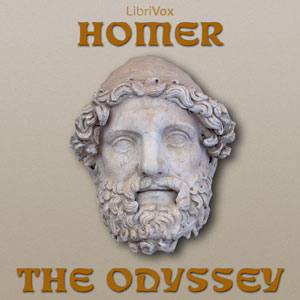The Odyssey (Version 3)
The Odyssey is one of two major ancient Greek epic poems attributed to Homer. It is, in part, a sequel to the Iliad, the other Homeric epic. The Odyssey is fundamental to the modern Western canon; it is the second-oldest extant work of Western literature, while the Iliad is the oldest. Scholars believe the Odyssey was composed near the end of the 8th century BC, somewhere in Ionia, the Greek coastal region of Anatolia. The poem mainly focuses on the Greek hero Odysseus (known as Ulysses in Roman myths), king of Ithaca, and his journey home after the fall of Troy. It takes Odysseus ten years to reach Ithaca after the ten-year Trojan War. In his absence, it is assumed Odysseus has died, and his wife Penelope and son Telemachus must deal with a group of unruly suitors, the Mnesteres or Proci, who compete for Penelope's hand in marriage. - Summary by Mark Nelson
Genre(s): Classics (Greek & Latin Antiquity)
Language: English
| Section | Chapter | Reader | Time |
|---|---|---|---|
| Play 01 | Book I | Mark Nelson |
00:24:47 |
| Play 02 | Book II | Mark Nelson |
00:24:46 |
| Play 03 | Book III | Mark Nelson |
00:27:54 |
| Play 04 | Book IV | Mark Nelson |
00:45:55 |
| Play 05 | Book V | Mark Nelson |
00:26:42 |
| Play 06 | Book VI | Mark Nelson |
00:19:21 |
| Play 07 | Book VII | Mark Nelson |
00:19:27 |
| Play 08 | Book VIII | Mark Nelson |
00:31:02 |
| Play 09 | Book IX | Mark Nelson |
00:31:43 |
| Play 10 | Book X | Mark Nelson |
00:30:32 |
| Play 11 | Book XI | Mark Nelson |
00:33:45 |
| Play 12 | Book XII | Mark Nelson |
00:25:22 |
| Play 13 | Book XIII | Mark Nelson |
00:23:36 |
| Play 14 | Book XIV | Mark Nelson |
00:29:27 |
| Play 15 | Book XV | Mark Nelson |
00:28:42 |
| Play 16 | Book XVI | Mark Nelson |
00:25:48 |
| Play 17 | Book XVII | Mark Nelson |
00:32:55 |
| Play 18 | Book XVIII | Mark Nelson |
00:23:36 |
| Play 19 | Book XIX | Mark Nelson |
00:35:00 |
| Play 20 | Book XX | Mark Nelson |
00:22:14 |
| Play 21 | Book XXI | Mark Nelson |
00:22:58 |
| Play 22 | Book XXII | Mark Nelson |
00:25:02 |
| Play 23 | Book XXIII | Mark Nelson |
00:20:51 |
| Play 24 | Book XXIV | Mark Nelson |
00:30:25 |
